
views
Preparing for Your Date

Get to know them first. Before you ever agree to go on a first date with someone, you should know basic information about them. Not only should you have some idea of whether or not your personalities are similar or if you share overlapping hobbies, you will want to know things like what their name is, what school they go to / what they do for a living, and their age. Preferably you should have an idea of what they look like as well and contact information. If your date does not want to give out their telephone number before asking for your own, that is considered sketchy. Do not be lulled into a false sense of security just because you know someone; 8 out of 10 rape victims know their assailant. Have a healthy amount of skepticism: just because someone tells you something doesn't mean they couldn't be lying, particularly if it sounds too good to be true.

Google them. What a person tells you they're like and what they may actually be like can be two different things. A Google search of their name may bring back results on Facebook, LinkedIn, and other social media websites that may give you a better feel for what your potential date is like when they're not trying to present their best side to you.

Tell someone. Pick a reliable friend, roommate, or family member and tell them that you're going on a date. Tell them where you're going, what time the date is supposed to start, and when it is expected to end. Tell them your date's full name, and if you have it their telephone number, give them that as well. Make sure they also have your telephone number. If you have a picture of the person you're going on a date with, give that to your friend, as well.
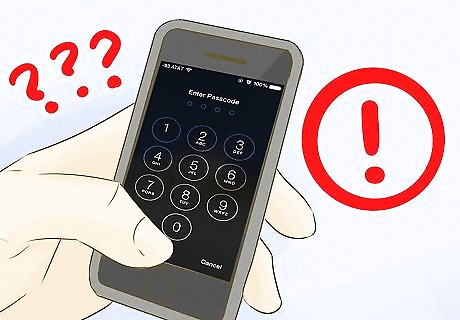
Ask a friend to check in on you. After you've given them your cell phone number for your date, ask them to please check in on you once or twice during the date with a phone call or text. Tell them that if you do not respond within two hours of a text or phone call that they should call the police.

Meet in a public place. Never invite a stranger to your home, agree to meet them at theirs, or agree to meet at any other private place for a first meeting. The ideal first-date location should be a place that is public and where there will be many people, like a restaurant, movie theater, or a club. It is important that you not go somewhere with someone you do not know well where you could be easily isolated. If you have another friend who is also dating who would be willing, you could try making it a double-date so that you're sure to not be alone.

Be responsible for your own transportation. Police recommend that you never tell a date where you live early on in the dating stages. You do not want an unsuccessful date to turn into a stalking situation. By driving yourself or getting a ride, you won't be dependent on them if things go south. If you take a bus or have someone coming to pick you up from your date, that gives you an extra excuse to leave if you need it.

Do not feel inclined to dress conservatively. Dressing conservatively does not guarantee your safety. Women get mistreated wearing sweatshirts as well as cocktail dresses, and it is not OK either way. Do not think that dressing a certain way will either protect you, or encourage untoward behavior. People have traditionally blamed women for "asking for it", when sexually assaulted when wearing sexy clothing, but this is no excuse or reason. Dress for mobility. If you have to leave a situation, or walk a block to get to the bus stop, be sure you can do so without getting blisters, tottering on too-high heels, getting frostbite, or otherwise unable to simply go if you need to.
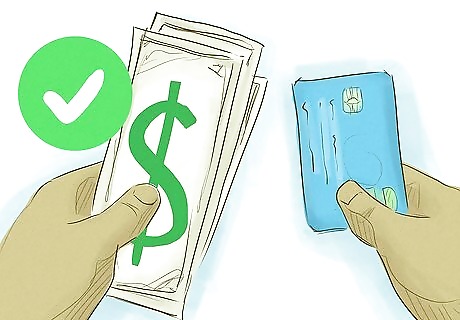
Pack the appropriate items. Make sure that you never leave for a first date without your cell phone and a wallet with cash. If you end up splitting the bill for dinner, avoiding using a credit or debit card means that you won't leave behind a paper trail that could link you to your workplace or home address. You will need your cell phone to send and receive texts and phone calls, and it may be handy in case of an emergency. Although some people may feel they are unnecessary, bringing mace and/or a rape whistle on the off chance your date turns violent could prevent you from becoming a victim, and should be very seriously considered.
Operating While on the Date

Courtesy-text your friend. Make sure that you respond to your friend that you asked to make sure you're okay. You don't want them to become falsely alarmed! Additionally, you can text them when you're arriving to the location, when you're leaving, and when you make it safely back home. It would also be polite to let them know if your date is going long.

Ask good questions. While you're on your date, of course you will have the opportunity to talk and get to know each other better. Don't waste this opportunity with small talk about the weather or your food. Use it to ask meaningful questions, like if they have any close friends, what their family was like growing up, and what their current most important goal is. Questions like these will reveal to you what kinds of values and mindset your date has, and give you greater insight as to whether this is someone you'd be interested in continuing to see.
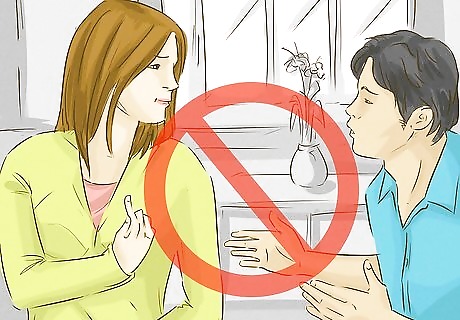
Be assertive. Only you can determine for yourself what you are comfortable with, whether it's if you want to move on to a more intimate setting, reveal more detailed information about yourself, or engage in sexual activities. If your date starts to pressure you for things you are not ready to do, don't feel like you have to give in to their desires. Just tell them a polite but firm no. A good partner will not be impatient and will respect your boundaries and opinions. Someone who continues to pressure you after you have said 'no' is putting off a very strong red flag.
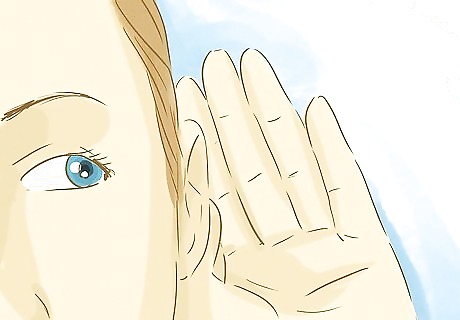
Watch out for disturbing behavior. Listen to the things that your date is saying and be on the look-out for warning signs. A date is the time for a person to be putting their best foot forward to impress you, and their behaviors will only become more relaxed with time. If they are behaving in ways that make you uncomfortable or anxious, this will probably not improve over time. They show up inappropriately angry or in a bad mood, which may or may not become directed toward you. They treat the waitstaff, employees, or strangers at any place where you meet poorly or aggressively. They refer to their exes or members of the opposite sex using derogatory language, or call them "crazy." They insult you or put you down. They tell you information that directly contradicts things they've told you previously, ie: it looks like they're lying to you. They make strange comments that seem out of place, like talking about their machete collection or punching exes. They ask questions about your or offer details about their sexual or marital history that seems inappropriate for a first date. They start making explicitly sexual comments or advances, or reveal their genitalia in public places.

Trust your instincts. Your brain has a way of trying to communicate with you when it recognizes logically that something dangerous or unsafe is happening by manipulating how you feel; we often call these feelings "gut instincts." When your brain registers that something unsafe is happening, it will create feelings of unease and tension in your stomach. Do not be afraid to listen to these feelings! Do not fall into the trap of feeling like you have to explain away or excuse a date's bad or strange behavior.

Stay sober. There's nothing wrong with going out for a drink, but it's generally inadvisable to get drunk. Drinking leads to lowered inhibitions, the reduced ability to assess risks and make good choices, impedes the ability to give consent, and makes it harder to fight back should someone try to sexually assault you. It can also lead people to being aggressors of sexual assault. Try planning a date during the daytime, when you normally won't be expected to drink anyway. Also, more people are out and about during the daytime, which can give you some extra security. If you do order a drink from the bar, opt for a bottled beer, and make sure it's opened in front of you.

Don't leave your drink unattended. Regardless of what you are drinking, whether it's alcohol or water, do not leave your glass unattended, even to use the restroom. GHB, Ketamine, and Rohypnol are all fast-acting drugs commonly referred to as "date rape drugs" that can be slipped into a beverage without you ever knowing it. Only accept drinks directly from a bartender or waiter; don't even let it pass through your date's hands. If you leave for the restroom and come back and forgot to finish your drink off before-hand, ask for a new one. If your date has a problem with that, the issue is with them, not you.

Be prepared to split. Although it would be nice to be honest if you're not into a person or not feeling safe with them, it is impossible to tell how someone may react to hearing that kind of statement. Particularly if you're feeling unsafe, there may be good reason for that, and you don't want them to react violently. So have some reason prepared for just-in-case, and don't be afraid to use it! If you arrived by public transportation, you could say that you have to leave to catch the bus. If your friend drove you, say that they have to pick you up early because they had a schedule conflict on their end. Get your friend to text you about a sick pet or a breakup and say that you're needed elsewhere.
Acting in an Emergency

Leave. If your date appears to violent, emotionally unstable, or makes you uncomfortable for any reason, it is okay to leave. Use any of the excuses that you have prepared and get out of there. If you are truly desperate and don't want them to know you're leaving, tell them you're going to the bathroom and take any personal items with you, then sneak out another way.

Get assistance. If your date tries to prevent you from leaving, physically or through verbal coercion, get someone nearby to help you, like a waiter or another couple. This could be as simple as asking them to get the manager or call the police, but the point is that by drawing other people into the situation, an aggressive person is more likely to back off out of a desire to not get into trouble. Get loud. Although embarrassment might make you want to keep quiet and not make a spectacle, it is to your advantage to be loud and make sure other people can hear that you are not interested in this person's advances or company. This may convince people, without your solicitation, to come help you.
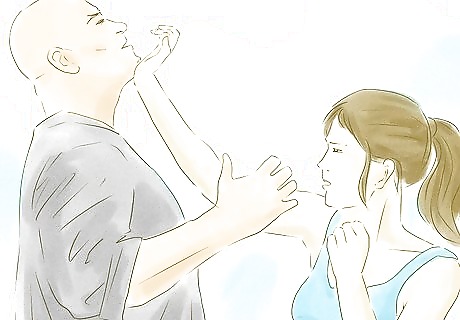
Fight back. If for some reason you should be cornered and there is no way to avoid violence, use proper self defense techniques to make your assailant back off. If you have it with you, using mace is perhaps the easiest method. When attacking, aim for the areas of the body where you can do the most damage in the least amount of time; these include the eyes, nose, ears, neck, knees, and groin. Kick the side of the knee to injure or even incapacitate an attacker. Gouge, poke, or scratch an attacker's eyes with your fingers or knuckles. If your attacker is very close to you, user the heel of your palm to strike the under portion of their nose, throwing the whole weight of your body into the motion. The goal of attacking your attacker is not to beat them up but to prevent them from following you and, in the case that they are holding you, make them let go.
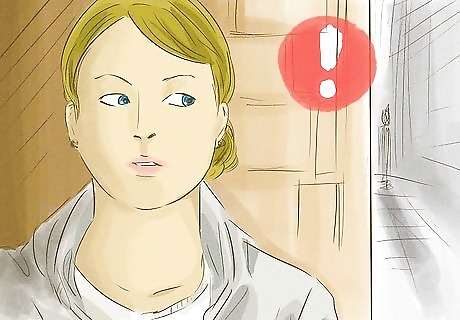
Get somewhere safe. Once your attacker lets go, run away, preferably in the opposite direction. If your attacker recovers and gets a hold of you after being hurt, they will likely be very angry, so the situation will be even more dangerous for you. Go somewhere where there are a lot of people, or get into your car to drive away. Do not immediately go back home. Should this person be capable of following you, you do not want to accidentally show them where you live.
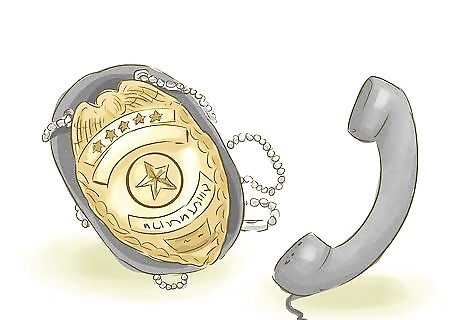
Call 9-1-1. If you have been attacked, this is considered an emergency situation. You will want to call 9-1-1 so that police can be dispatched to help you and, if necessary, make an arrest. Be prepared that when you contact the emergency operator you will need to try to tell them exactly what happened, where it happened, and where you are now. Stay on the line. A sudden disconnect could mean that something has gone very wrong for you, and the operator will try to call you back. This could delay emergency response time and tie up the lines, so be sure to stay on the line until you are told you can hang up.













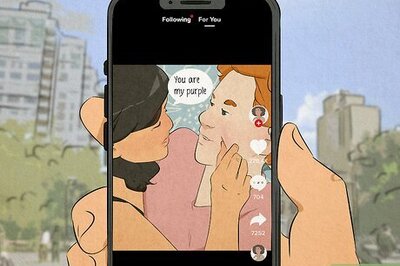





Comments
0 comment